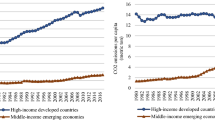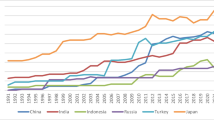Abstract
In thirst for economic growth, economies are engaged in anti-environmental activities that drive them towards climate change and CO2 emissions. Extensive CO2 emissions is a serious threat around the globe, especially in low-income countries that can prove detrimental to the environment. To prevent the worst impacts of carbon emission, it becomes necessary to explore the cause of CO2 emissions. In this vein, this work is conducted to evaluate the determinants of CO2 emissions in low-income countries spanning from 2000 to 2020. For estimation of models, panel data techniques are employed. The outcome of the study revealed that trade FDI, urbanization, and GDP per capita are the main contributing factors to environmental degradation. Trade openness has also impacted environmental degradation positively but insignificantly. In contrast, population density and domestic credit to private sector (DCPS) have negatively impacted low-income countries’ carbon emissions. The study extended important policy implications to low-income countries’ governments and environmental policymakers.
Similar content being viewed by others
Data availability
Data will be made available upon receiving suitable request.
References
Acharyya J (2009) FDI, growth and the environment: evidence from India on CO2 emission during the last two decades. J Econ Dev 34(1):43
Acheampong AO (2019) Modelling for insight: does financial development improve environmental quality? Energy Econ 83:156–179
Adams S, Klobodu EKM (2017) Urbanization, democracy, bureaucratic quality, and environmental degradation. J Policy Model 39(6):1035–1051
Afridi MA, Kehelwalatenna S, Naseem I, Tahir M (2019) Per capita income, trade openness, urbanization, energy consumption, and CO2 emissions: an empirical study on the SAARC Region. Environ Sci Pollut Res 26(29):29978–29990
Ahmad M, Zhao Z-Y, Irfan M, Mukeshimana MC (2019) Empirics on influencing mechanisms among energy, finance, trade, environment, and economic growth: a heterogeneous dynamic panel data analysis of China. Environ Sci Pollut Res 26(14):14148–14170
Ali HS, Law SH, Lin WL, Yusop Z, Chin L, Bare UAA (2019) Financial development and carbon dioxide emissions in Nigeria: evidence from the ARDL bounds approach. GeoJournal 84(3):641–655
Ali MU, Gong Z, Ali MU, Wu X, Yao C (2021) Fossil energy consumption, economic development, inward FDI impact on CO2 emissions in Pakistan: testing EKC hypothesis through ARDL model. Int J Financ Econ 26(3):3210–3221
Al-mulali U, BintiChe Sab CN, Fereidouni HG (2012) Exploring the bi-directional long run relationship between urbanization, energy consumption, and carbon dioxide emission. Energy 46(1):156–167
Al-mulali U, Fereidouni HG, Lee JYM, Sab CNBC (2013) Exploring the relationship between urbanization, energy consumption, and CO2 emission in MENA countries. Renew Sustain Energy Rev 23:107–112
Alvarado R, Ponce P, Criollo A, Córdova K, Khan MK (2018) Environmental degradation and real per capita output: new evidence at the global level grouping countries by income levels. J Clean Prod 189:13–20
Aye GC, Edoja PE (2017) Effect of economic growth on CO2 emission in developing countries: evidence from a dynamic panel threshold model. Cogent Econ Financ 5(1):1379239
Blanco L, Gonzalez F, Ruiz I (2013) The impact of FDI on CO2 emissions in Latin America. Oxf Dev Stud 41(1):104–121
Bosupeng M (2016) The effect of exports on carbon dioxide emissions: policy implications. Int J Manag Econ 51(1):20–32
Burns DK, Jones AP, Goryakin Y, Suhrcke M (2017) Is foreign direct investment good for health in low and middle income countries? An instrumental variable approach. Soc Sci Med 181:74–82
Chang C-P, Wen J, Dong M, Hao Y (2018) Does government ideology affect environmental pollutions? New evidence from instrumental variable quantile regression estimations. Energy Policy 113:386–400
Dauda L, Long X, Mensah CN, Salman M, Boamah KB, Ampon-Wireko S, Kofi Dogbe CS (2021) Innovation, trade openness and CO2 emissions in selected countries in Africa. J Clean Prod 281:125143
Dong K, Dong X, Dong C (2019) Determinants of the global and regional CO2 emissions: what causes what and where? Appl Econ 51(46):5031–5044
EIA. 2017. Annual Energy Outlook 2017 with projections to 2050. US Energy Information Administration:64.
Essandoh OK, Islam M, Kakinaka M (2020) Linking international trade and foreign direct investment to CO2 emissions: any differences between developed and developing countries? Sci Total Environ 712:136437
Friedl B, Getzner M (2003) Determinants of CO2 emissions in a small open economy. Ecol Econ 45(1):133–148
Ganda F (2019) The environmental impacts of financial development in OECD countries: a panel GMM approach. Environ Sci Pollut Res 26(7):6758–6772
Gök A (2020) The role of financial development on carbon emissions: a meta regression analysis. Environ Sci Pollut Res 27(11):11618–11636
Gökmenoğlu K, Taspinar N (2016) The relationship between Co2 emissions, energy consumption, economic growth and FDI: the case of Turkey. J Int Trade Econ Dev 25(5):706–723
Hanif I (2018) Impact of economic growth, nonrenewable and renewable energy consumption, and urbanization on carbon emissions in Sub-Saharan Africa. Environ Sci Pollut Res 25(15):15057–15067
Haseeb A, Xia E, Danish M, Baloch A, Abbas K (2018) Financial development, globalization, and CO(2) emission in the presence of EKC: evidence from BRICS countries. Environ Sci Pollut Res Int 25(31):31283–31296
Haug AA, Ucal M (2019) The role of trade and FDI for CO2 emissions in Turkey: nonlinear relationships. Energy Econ 81:297–307
Hausman JA (1978) Specification tests in econometrics. Econometrica: Journal of the Econometric Society:1251–1271
Jan AA, Lai F-W, Tahir M (2021) Developing an Islamic Corporate Governance framework to examine sustainability performance in Islamic Banks and Financial Institutions. J Clean Prod 315:128099
Jorgenson AK, Clark B (2010) Assessing the temporal stability of the population/environment relationship in comparative perspective: a cross-national panel study of carbon dioxide emissions, 1960–2005. Popul Environ 32(1):27–41
Lai F-W, Shad MK, Shah SQA (2021) Conceptualizing corporate sustainability reporting and risk management towards green growth in the Malaysian oil and gas industry. SHS Web Conf 124:04001
Liddle B (2014) Impact of population, age structure, and urbanization on carbon emissions/energy consumption: evidence from macro-level, cross-country analyses. Popul Environ 35(3):286–304
Lidle B (2015) What are the carbon emissions elasticities for income and population? Bridging STIRPAT and EKC via robust heterogeneous panel estimates. Glob Environ Chang 31:62–73
Liu X, Bae J (2018) Urbanization and industrialization impact of CO2 emissions in China. J Clean Prod 172:178–186
Lv Z, Xu T (2019) Trade openness, urbanization and CO2 emissions: dynamic panel data analysis of middle-income countries. J Int Trade Econ Dev 28(3):317–330
Mahmood H, Maalel N, Zarrad O (2019) Trade openness and CO2 emissions: evidence from Tunisia. Sustain 11(12):3295
Mohsin M, Abbas Q, Zhang J, Ikram M, Iqbal N (2019) Integrated effect of energy consumption, economic development, and population growth on CO(2) based environmental degradation: a case of transport sector. Environ Sci Pollut Res Int 26(32):32824–32835
Muhammad S, Long X, Salman M, Dauda L (2020) Effect of urbanization and international trade on CO2 emissions across 65 belt and road initiative countries. Energy 196:117102
Nguyen KH, Kakinaka M (2019) Renewable energy consumption, carbon emissions, and development stages: some evidence from panel cointegration analysis. Renew Energy 132:1049–1057
Ohlan R (2015) The impact of population density, energy consumption, economic growth and trade openness on CO2 emissions in India. Nat Hazards 79(2):1409–1428
Ozatac N, Gokmenoglu KK, Taspinar N (2017) Testing the EKC hypothesis by considering trade openness, urbanization, and financial development: the case of Turkey. Environ Sci Pollut Res 24(20):16690–16701
Poumanyvong P, Kaneko S (2010) Does urbanization lead to less energy use and lower CO2 emissions? Cross-Country Anal Ecol Econ 70(2):434–444
Rafindadi AA, Muye IM, Kaita RA (2018) The effects of FDI and energy consumption on environmental pollution in predominantly resource-based economies of the GCC. Sustain Energy Technol Assess 25:126–137
Rahman MM, Alam K (2021) Clean energy, population density, urbanization and environmental pollution nexus: evidence from Bangladesh. Renew Energy 172:1063–1072
Seetanah B, Sannassee RV, Fauzel S, Soobaruth Y, Giudici G, Nguyen APH (2019) Impact of economic and financial development on environmental degradation: evidence from Small Island Developing States (SIDS). Emerg Mark Financ Trade 55(2):308–322
Shah SQA, Khan I, Shah SSA, Tahir M (2018) Factors affecting liquidity of banks: empirical evidence from the banking sector of Pakistan. Colombo Bus J 9(1):1–18
Shah SQA, Lai F-W, Shad MK, Konečná Z, Goni FA, Chofreh AG, Klemeš JJ (2021) The inclusion of intellectual capital into the green board committee to enhance firm performance. Sustain 13(19):1–21
Shahbaz M, Kumar Tiwari A, Nasir M (2013) The effects of financial development, economic growth, coal consumption and trade openness on CO2 emissions in South Africa. Energy Policy 61:1452–1459
Shahbaz M, Nasreen S, Abbas F, Anis O (2015b) Does foreign direct investment impede environmental quality in high-, middle-, and low-income countries? Energy Econ 51:275–287
Shahbaz, M., M. Bhattacharya, and K. Ahmed. 2015a. Growth-globalisation-emissions nexus: the role of population in Australia: Monash Univ., Department of Economics.
Solarin SA, Al-Mulali U (2018) Influence of foreign direct investment on indicators of environmental degradation. Environ Sci Pollut Res Int 25(25):24845–24859
Tahir M, Azid T (2015) The relationship between international trade openness and economic growth in the developing economies. J Chin Econ Foreign Trade Stud 8(2):123–139
Tahir M, Shah SQA, Khan MM, Afridi MA (2018) Intellectual Capital and Financial Performance of Banks in Pakistan. Dialogue (pakistan) 13(1):105–118
Tahir M, Jan AA, Shah SQA, Alam MB, Afridi MA, Tariq YB, Bashir MF (2020) Foreign inflows and economic growth in Pakistan: some new insights. J Chin Econ Foreign Trade Stud 13(3):97–113
Tahir M, Alam MB (2022) Does well banking performance attract FDI? Empirical evidence from the SAARC economies. Int J Emerg Mark 17(2):413–432. https://doi.org/10.1108/IJOEM-04-2020-0441
Wang Q, Li L (2021) The effects of population aging, life expectancy, unemployment rate, population density, per capita GDP, urbanization on per capita carbon emissions. Sustain Prod Consum 28:760–774
WDI. 2018. Data, World Bank.
White H (1980) A heteroskedasticity-consistent covariance matrix estimator and a direct test for heteroskedasticity. Econometrica 48(4):817–838
Wijayatunga, P., and P. Fernando. 2013. An overview of energy cooperation in South Asia.
Xu Z, Baloch MA, Danish F, Meng JZ, Mahmood Z (2018) Nexus between financial development and CO2 emissions in Saudi Arabia: analyzing the role of globalization. Environ Sci Pollut Res 25(28):28378–28390
Zhang Y, Zhang S (2018) The impacts of GDP, trade structure, exchange rate and FDI inflows on China’s carbon emissions. Energy Policy 120:347–353
Zhu Q, Peng X (2012) The impacts of population change on carbon emissions in China during 1978–2008. Environ Impact Assess Rev 36:1–8
Author information
Authors and Affiliations
Contributions
Muhammad Tahir introduced the idea while Syed Azmat Ali Shah wrote the introduction section and collected data and have done formal analysis. Syed Quaid Ali Shah wrote the introduction section and provided commentary on analysis. Muhammad Tahir edited the final draft. All authors have approved the draft for submission.
Corresponding author
Ethics declarations
Competing interests
The authors declare no competing interests.
Additional information
Responsible Editor: Philippe Garrigues
Publisher's note
Springer Nature remains neutral with regard to jurisdictional claims in published maps and institutional affiliations.
Rights and permissions
About this article
Cite this article
Shah, S.A.A., Shah, S.Q.A. & Tahir, M. Determinants of CO2 emissions: exploring the unexplored in low-income countries. Environ Sci Pollut Res 29, 48276–48284 (2022). https://doi.org/10.1007/s11356-022-19319-3
Received:
Accepted:
Published:
Issue Date:
DOI: https://doi.org/10.1007/s11356-022-19319-3




